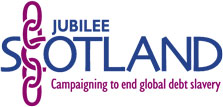|
Reasons why we need to cut the strings!
These conditions
hurt.
Countless studies have shown that economic policy conditions attached
to debt relief and aid have harmed indebted countries. For instance,
Senegal was forced to liberalise its groundnut sector, a disastrous
policy that resulted in more than two thirds of the crop not being
collected, farmers collectively losing millions of dollars, economic
growth being cut in half and a near state of famine in rural areas.
But the World Bank and International Monetary Fund continued to
insist on further liberalisation a condition of debt relief for
Senegal.
They undermine
democracy.
Countries often resist implementing these policies, but are forced
to adopt them even when their people protest and their parliaments
oppose them. For instance, the IMF requirement that Zambia privatise
its state bank in order to get debt relief prompted mass public
protest, a parliamentary motion opposing the privatisation and the
refusal of the President. But the IMF insisted that "if they
don’t sell, they won’t get the money".
They are inconsistent with UK and
G8 statements.
The UK’s has promised not to attach economic policy conditions
to aid it gives directly to poor countries, saying it is "inappropriate
and ineffective for donors to impose policies". The Commission
for Africa questioned the role of conditions, for instance stating
that "forced liberalisation will not work" as a way of
reducing poverty. The recent G8 communiqué also stated clearly
that "developing countries…need to decide, plan and sequence
their economic policies." Despite this, debt relief and cancellation
granted by the World Bank and IMF - which the UK helps to fund -
still has huge numbers of damaging conditions attached. The UK is
also using implementation of World Bank conditions as the criteria
for deciding which countries will get the additional debt relief
it is now offering.
These conditions
are not about accountability.
Jubilee Scotland supports efforts to ensure that governments are
accountable to their own people over how they spend the funds released
by debt cancellation. Some countries have successful mechanisms
in place; in others, campaigners are calling for greater accountability,
and their efforts and calls should be reinforced. But that is not
what these conditions achieve; instead, they impose detailed economic
policies onto poor countries that often harm the poor and benefit
those in the rich world.
The 2005 G8 debt deal, although limited, was a
real achievement liberating $1bn for 18 countries annually, which
can now be used for public services and poverty alleviation. This
is a tribute to the
unceasing efforts of campaigners worldwide. Let us now keep up the
pressure and demand an end to debt, an end to conditions, an end
to poverty.
CLICK HERE TO
READ THE DEMANDS WE ARE MAKING TO HILARY BENN
|

